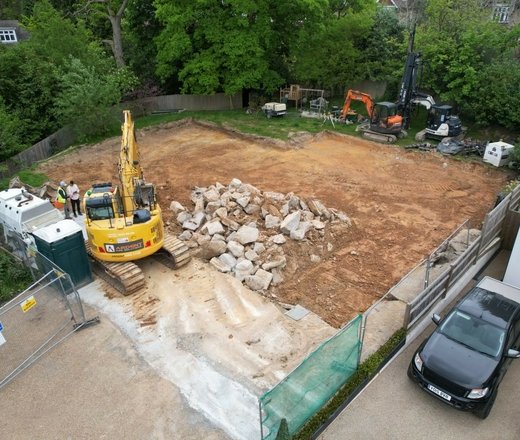When it comes to selling a house or flat, you’re probably inclined to go for the default option: a traditional, high street estate agent – which is obviously fine with us! For many sellers, this absolutely remains the best option. However, it’s also worth considering the pros and cons of using other options, such as an online agent, an auction house, or, more unusually a property raffle.
1. A high street estate agent
There are good reasons why the majority of sellers choose a high street estate agent to help them sell their property. A good agent has a clear understanding of the local market and knows where any particular property sits within it. They can give potential sellers realistic expectations of what current sold property prices mean for their property and of how long a property may take to sell. They should also work hard to showcase the property to its best advantage and market it to likely buyers. Of course, choosing an effective estate agent can seem something of a hit and miss affair to would-be sellers. Word of mouth recommendations can help but so, too, can conducting your own research. Ask yourself which agents have most visibility in your area? What do their shop windows and websites look like? Do they make sure their properties are also listed on major online property portals? Many agents also conduct viewings, which can be a relief to busy sellers. This means that, if the seller wishes, they can also filter feedback to ensure only relevant information is relayed.
2. An online estate agent
Online agents are a newer innovation. A product of the internet age, they place more onus on the seller to conduct viewings and receive feedback. They are also usually a cheaper option, which is particularly attractive for those counting every penny. Where high street agents typically charge between 1 and 2 per cent of a property’s selling price as a fee, online agents usually charge a fixed fee of between around £99 and £1,000. These lower costs are made possible by the fact that online agents utilise call centres and have a lower overall staffing cost model: the onus is on the seller to be much more involved in their sale. They may even require sellers to take their own property photographs and assist with the drawing up of particulars. As online estate agents develop, a hybrid model that takes in some of the features of traditional high street agents is evolving. For example, some online estate agents now give sellers access to local property experts, who draw up particulars, take photographs and even conduct viewings. Obviously, a seller who wishes to take advantage of these extras can expect to pay more for the service.
3. A property auction house
Often favoured by sellers in a hurry, auctions can also be very useful for selling “difficult” properties. This category can encompass all kinds of homes. For example, it might include somewhere in need of such extensive renovation that a buyer would be unlikely to secure a mortgage on it. It can also include properties that are atypical for their area or that defy easy categorisation. Investors often target property auctions in the hope of snagging a bargain or simply because the buying process is quicker and more straightforward than a traditional sale. A first time would-be auction seller may be worried about letting their property go for less than they can afford to. However, sellers are allowed to set a reserve price that can be higher than the property’s guide price. Bidders do not know what the reserve is set at, but the auctioneer will not sell the property unless a bid reaches the reserve.
4. Raffles or “win a house” schemes
Selling your home by raffle is a gamble in more ways than one. Not only are you asking would-be buyers to gamble £10, £20 or whatever price you choose on the chance that their raffle ticket may come up trumps, but you also risk falling foul of the Gambling Commission. Raffles have risen in popularity in recent years. Industry experts suspect this has less to do with boredom with more traditional means of property selling and much more to do with stagnant market conditions. When sold property prices are sluggish, some sellers can be slow to adjust their expectations and continue to price emotionally, based on what they feel their home should fetch. If market conditions are such that the property fails to attract what the seller considers to be a “suitable” offer, attempting to raise the money via a raffle may begin to look more attractive.
Most raffle schemes operate on a similar premise: the owner tries to sell in excess of a certain number of tickets. The tickets are priced at a level designed to convince as many people as possible that buying a ticket is a gamble that’s worth the likely loss of the outlay. The majority of schemes operate under terms and conditions that allow the organiser to award cash (minus charity donations and expenses) if the raffle does not attract sufficient interest.
Unfortunately, attempting to sell a property via a raffle is hedged with problems. The Gambling Commission takes a keen interest in such raffles and is not shy of shutting them down. Most fall foul of rules that only “good causes” are permitted to operate raffles or lotteries that charge an entry fee and that have a result that’s based on chance. Commonly defined as not-for-profit organisations, charities and local authorities, the average property seller does not fall within the definition. Some attempt to bypass the problem by requiring entrants to answer a question but even this is not without its difficulties. According to the law, questions must require the exercise of a certain amount of skill but, from the perspective of the seller, posing too difficult a question risks deterring entrants.
Even if a would-be seller can surmount these problems, another issue, in the shape of tax liability, may lie in wait. HMRC may consider raffle proceeds to be income, from which both income tax and NICs need deducting.
Source:
Nethouseprices.com 23.04.19
Market your property with Maddisons Residential
For many, the first point in their house moving journey, is to understand the value of their current home. Whether you want a quick, instant, online indication, or a more robust property specific and individual valuation, we would be delighted to help.






